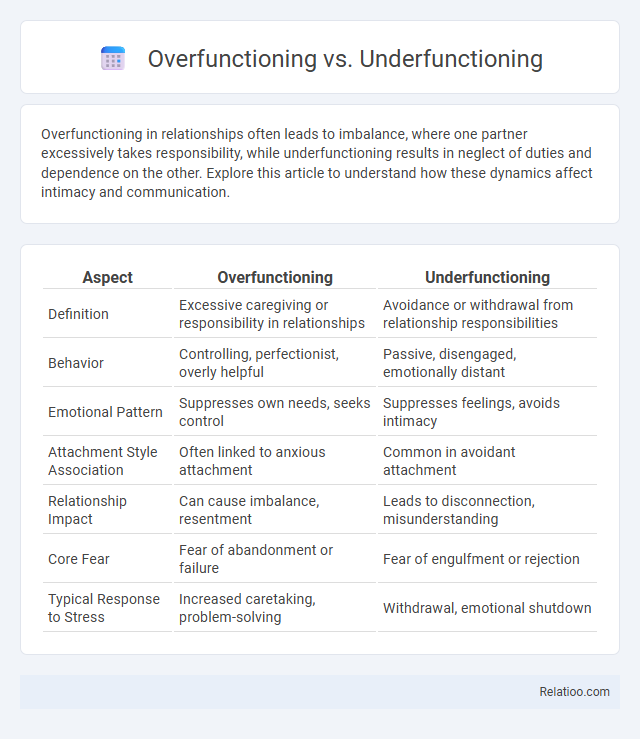Overfunctioning in relationships often leads to imbalance, where one partner excessively takes responsibility, while underfunctioning results in neglect of duties and dependence on the other. Explore this article to understand how these dynamics affect intimacy and communication.
Table of Comparison
| Aspect | Overfunctioning | Underfunctioning |
|---|---|---|
| Definition | Excessive caregiving or responsibility in relationships | Avoidance or withdrawal from relationship responsibilities |
| Behavior | Controlling, perfectionist, overly helpful | Passive, disengaged, emotionally distant |
| Emotional Pattern | Suppresses own needs, seeks control | Suppresses feelings, avoids intimacy |
| Attachment Style Association | Often linked to anxious attachment | Common in avoidant attachment |
| Relationship Impact | Can cause imbalance, resentment | Leads to disconnection, misunderstanding |
| Core Fear | Fear of abandonment or failure | Fear of engulfment or rejection |
| Typical Response to Stress | Increased caretaking, problem-solving | Withdrawal, emotional shutdown |
Understanding Overfunctioning and Underfunctioning
Understanding overfunctioning involves recognizing when you take excessive responsibility in relationships or tasks, often leading to burnout and imbalance. Underfunctioning, by contrast, occurs when individuals avoid responsibilities or fail to meet expectations, potentially causing frustration and stagnation. Identifying these patterns in yourself helps create healthier dynamics by promoting accountability without overwhelming or neglecting your role.
Key Differences Between Overfunctioning and Underfunctioning
Overfunctioning involves taking excessive responsibility and control in situations, often leading to burnout and resentment, while underfunctioning is characterized by avoidance of responsibilities, resulting in missed opportunities and decreased productivity. Overfunctioners tend to compensate for others' shortcomings, whereas underfunctioners may rely on others to take charge or complete tasks. Understanding these key differences helps you address imbalances and foster healthier collaboration and performance in personal and professional environments.
Psychological Roots of Overfunctioning Behaviors
Overfunctioning behaviors often stem from deep psychological roots such as anxiety, fear of losing control, or low self-worth, leading individuals to take on excessive responsibility in relationships or work. Underfunctioning, by contrast, may arise from feelings of helplessness or learned helplessness, where individuals avoid tasks to evade perceived failure or criticism. Understanding your own triggers for overfunctioning can help balance healthy involvement with personal boundaries and prevent burnout.
Causes and Triggers of Underfunctioning
Underfunctioning often stems from chronic stress, fear of failure, or low self-esteem, which inhibit motivation and productivity. Emotional trauma, lack of skills, or unclear expectations also act as significant triggers, leading individuals to withdraw or avoid tasks. Unlike overfunctioning, which is driven by control or perfectionism, underfunctioning is rooted in avoidance and feelings of helplessness.
Signs You May Be Overfunctioning
Signs You may be overfunctioning include constantly taking on more tasks than you can handle, feeling responsible for others' emotions, and struggling to delegate or ask for help. Your productivity often masks stress and burnout, as you push beyond healthy limits to maintain control. Recognizing behaviors like perfectionism, difficulty saying no, and neglecting self-care is crucial to restoring balance in your life.
Common Patterns of Underfunctioning
Common patterns of underfunctioning include procrastination, lack of initiative, and avoidance of responsibility, often resulting in decreased productivity and increased stress for teams. Individuals who underfunction may display low motivation, poor time management, and difficulty meeting deadlines, impacting overall organizational performance. Addressing these behaviors requires clear expectations, consistent feedback, and supportive resources to promote engagement and accountability.
Impact on Relationships and Family Dynamics
Overfunctioning often leads to imbalance in relationships, where one person assumes excessive responsibility, causing others to feel disempowered or dependent, which disrupts healthy family dynamics. Underfunctioning creates challenges as individuals may avoid responsibilities, leading to frustration and resentment and increasing tension within the family unit. Understanding your role in these patterns is crucial for fostering mutual support, improving communication, and promoting emotional stability in relationships and family systems.
Overfunctioning and Underfunctioning at Work
Overfunctioning at work often leads to burnout as you take on excessive responsibilities, aiming to control outcomes and compensate for others' shortcomings. Underfunctioning, conversely, can undermine team productivity and morale when tasks are neglected or delayed, placing extra pressure on colleagues. Balancing your role by setting clear boundaries and relying on effective delegation improves overall workplace efficiency and fosters healthier team dynamics.
Breaking the Cycle: Strategies for Balance
Breaking the cycle of overfunctioning and underfunctioning requires intentional strategies to establish healthy boundaries and promote accountability within relationships. Techniques such as clear communication, delegation of responsibilities, and fostering self-awareness help individuals recognize their roles and adjust patterns that lead to imbalance. Consistent practice of these methods supports sustainable personal growth and equitable task distribution.
Seeking Professional Help and Self-Care Tips
Overfunctioning often leads to burnout due to excessive responsibility, while underfunctioning can cause missed opportunities and stagnation; seeking professional help such as therapy or coaching can provide tailored strategies to balance your roles effectively. Implementing self-care tips like setting boundaries, practicing mindfulness, and prioritizing rest helps regulate your energy levels and improve overall functioning. You can regain control and foster healthier behavior patterns by addressing these tendencies through consistent support and intentional self-care practices.

Infographic: Overfunctioning vs Underfunctioning
 relatioo.com
relatioo.com